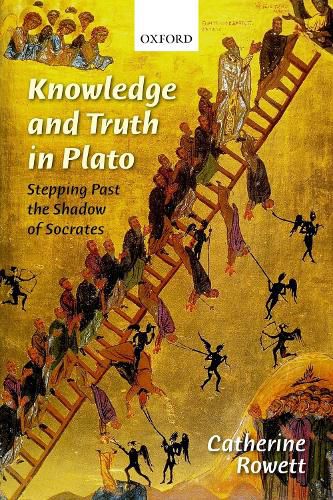Readings Newsletter
Become a Readings Member to make your shopping experience even easier.
Sign in or sign up for free!
You’re not far away from qualifying for FREE standard shipping within Australia
You’ve qualified for FREE standard shipping within Australia
The cart is loading…






Several myths about Plato’s work are decisively challenged by Catherine Rowett: the idea that Plato agreed with Socrates about the need for a definition of what we know; the idea that he set out to define justice in the Republic; the idea that knowledge is a kind of true belief, or that Plato ever thought that it might be something like that; the idea that knowledge proper is propositional, and that the Theaetetus was Plato’s best attempt to define knowledge as a species of belief, and that it only failed due to his incompetence. Instead Rowett argues that Plato was replacing the failed methods of Socrates, including his attempt to find a definition or single common factor, and that he replaced those methods with methods derived from geometry, including methods that involve inference from shadows to their originals (a method which Rowett calls the iconic method ). The book includes detailed studies of the Meno, Republic and Theaetetus, and argues that the insights that Plato brings about the nature of conceptual knowledge, its importance in underpinning all other activities, and about the notion of truth as it applies to conceptual competence, are significant and should be taken seriously as a corrective to areas in which current analytic philosophy has lost its way.
$9.00 standard shipping within Australia
FREE standard shipping within Australia for orders over $100.00
Express & International shipping calculated at checkout
Several myths about Plato’s work are decisively challenged by Catherine Rowett: the idea that Plato agreed with Socrates about the need for a definition of what we know; the idea that he set out to define justice in the Republic; the idea that knowledge is a kind of true belief, or that Plato ever thought that it might be something like that; the idea that knowledge proper is propositional, and that the Theaetetus was Plato’s best attempt to define knowledge as a species of belief, and that it only failed due to his incompetence. Instead Rowett argues that Plato was replacing the failed methods of Socrates, including his attempt to find a definition or single common factor, and that he replaced those methods with methods derived from geometry, including methods that involve inference from shadows to their originals (a method which Rowett calls the iconic method ). The book includes detailed studies of the Meno, Republic and Theaetetus, and argues that the insights that Plato brings about the nature of conceptual knowledge, its importance in underpinning all other activities, and about the notion of truth as it applies to conceptual competence, are significant and should be taken seriously as a corrective to areas in which current analytic philosophy has lost its way.